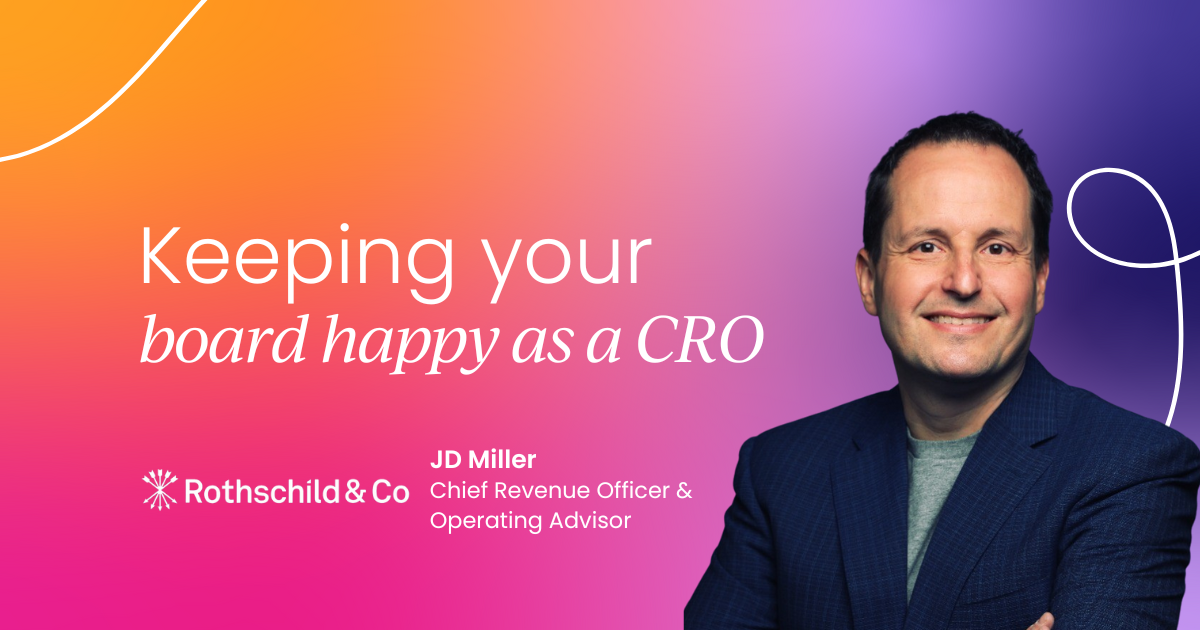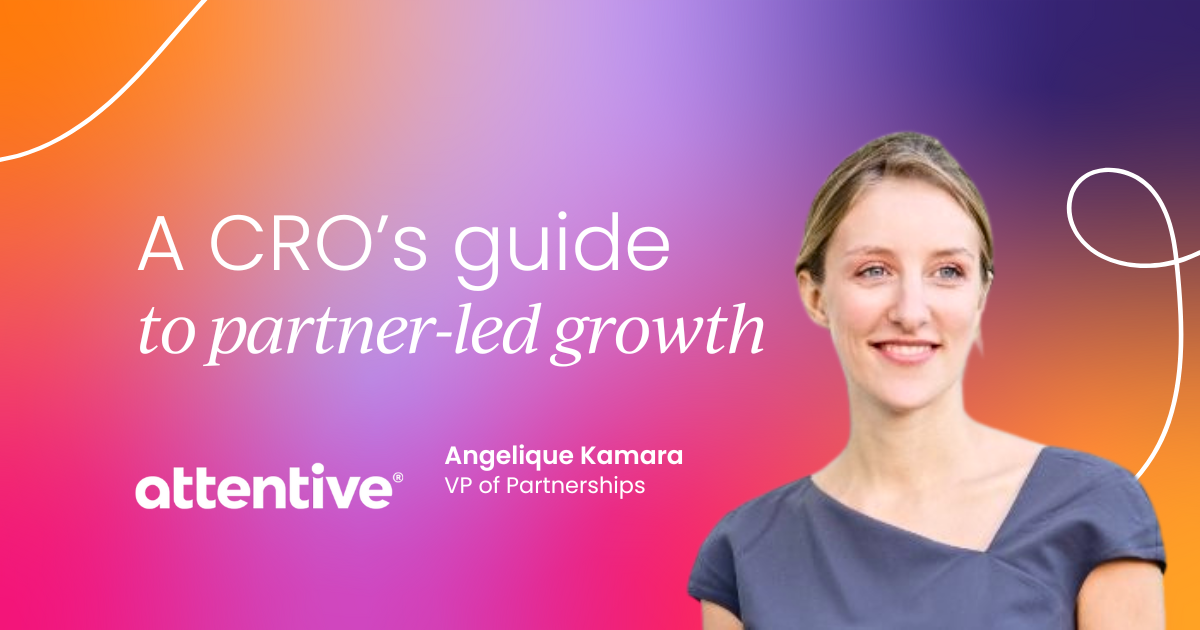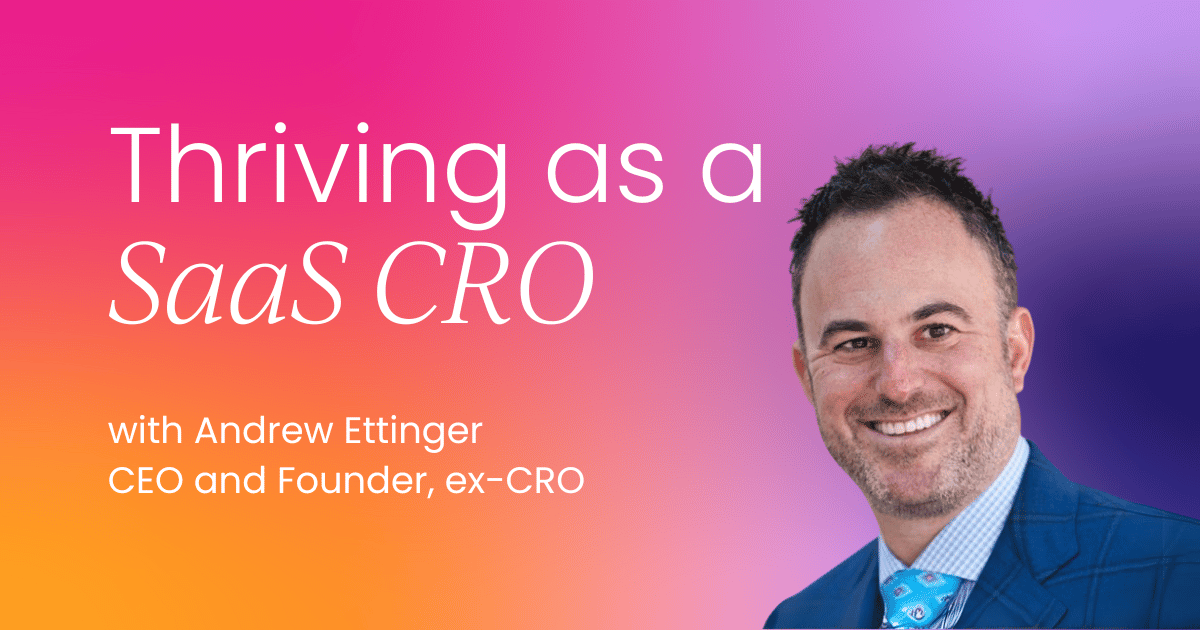This article is adapted from Andrew’s episode of CRO Insights: How CROs win, hosted by Warren Zenna. Listen to the full conversation here.
When I graduated college, I was a BDR and I didn't know it. They handed me a stack of printed-out leads from a website and said, ‘Start calling people and convert them to trials’.
Today that’s known as product-led growth, so I learned those skills in the trenches and wound up advancing from there, and have spent the last 20 to 25 years in cloud, data, AI, and infrastructure in the intersection of those technologies for enterprise customers in the B2B space.
I've enjoyed being part of a bunch of great companies, taking one company public, raising a bunch of money, and other startups with good exits. It has been a really fun ride and a privilege to have the opportunity to be in this great industry.
I’m looking forward to sharing some of my insights as a CRO with others.
Defining the Chief Revenue Officer role
Let me start with what the CRO role isn’t: it's not just a fancy title for a highly qualified VP of Sales to make them feel good.
A Chief Revenue Officer should be a true operational partner to the CEO and founder. They need to have alignment, impact, and influence across sales, marketing, success, product, and engineering.
They're the calming force that brings all these teams together, ensuring everyone's rowing in the same direction, focused on the same problems, targeting the same ideal customer profiles, and engaging with the same personas.
It's about making that entire operating system work in unison, partnering closely with the CEO.

The problem with this definition
However, very few CROs are appointed this way, instead, many Chief Revenue Officers end up just running sales.
The problem comes from both sides.
There's nothing wrong with being a great VP of Sales – it's still one of the most critical roles in a company. I'm just highlighting the distinction between the two roles.
When you take someone who's really good at sales and ask them to do something they don't have experience in or maybe don't love doing, it creates stress in the system.
Then from the top down, if the company isn't truly ready to embrace what a real CRO can bring you get a lot of tension. This problem gets amplified when you add potentially unrealistic growth targets and misaligned capacity planning, ramp plans, and operational metrics.
Any of these elements can go wrong, and even when everything's aligned, it's still a challenging role.
CRO Insights host, Warren Zenna, adds:
“I've observed that the relationship between a CRO and CEO is the most critical one in the entire organization.
“When they're not aligned on these fundamentals, it usually doesn't work. Given the CRO's massive impact on the company, if that relationship isn't solid from the foundation, it typically ends in disaster.
“That's why most Chief Revenue Officers don't last more than 16 or 17 months, which is about the average tenure now.”

Fulfilling the CRO role
Operating as a true CRO really comes down to trust and cadence with your CEO and business partner. It’s crucial you can clearly articulate what you're going to achieve together.
Anyone can put together 30-60-90 day plans – these days you could even have ChatGPT do it – but you need to truly align on the core priorities and then over-communicate with your business partner as you tackle them.
You need to maintain that operating rhythm together, working from clear objectives that can shift when needed – whether it's focusing more on sales, demand generation, or helping the engineering team understand which features matter most to our personas.
I was fortunate to work with fantastic CEOs who were well-aligned with the core objectives.
I also invested significant time in understanding marketing, demand generation, and building my technical skills. That helped me earn the respect of engineering leaders and drive real collaboration.
It wasn't my core skill set initially, but I worked hard at it, and I'm glad I did.

Mistakes and learnings
Early on, I made a couple of related mistakes.
The first was expecting every salesperson to ramp up as quickly as I did, and exceed their quota like I could.
When you're humble, you don't view yourself as particularly smart – you just think you're doing the right things to get results. So, you assume it should be systematic, which isn’t the case looking back.
Another big learning experience was around demand generation.
We created demand through our outbound efforts, but we weren't doing enough with traditional marketing and demand generation – the tactics, content, all of that. I wasn't as deeply involved there as I could have been.
I eventually realized these things needed to work together to be truly successful.
The third major mistake was being convinced we could handle a few large outlier deals outside our ideal customer profile just because they were big brand names with big dollar signs attached.
Those deals can kill you if your organization isn't ready to support and sustain them while still accomplishing all their other engineering tasks.
I've made dozens of mistakes – probably some in the last hour or two – that's just part of the game. But these are the big ones that stick out over time.

Product-led vs service-led strategy
In product-led growth or open-source organizations, nobody wants to talk to a salesperson early in their journey. You'll just mess everything up, regardless of which company they're from.
They want to try the product first.
And you need to match them with the right persona.
If you've got a data engineer logging in, they'd probably prefer guidance from another data engineer through that process. It’s crucial you wait for their 'aha moment' before bringing in sales.
There are no shortcuts here – just because you have PLG doesn't mean your flywheel and pipeline automatically moves faster.
Many users are happy staying in the free tier, and that's okay.
With open source, you need people to understand that free usage is good – it creates virality for your project, brings in more users, and helps solve more problems. The rising tide lifts all boats.
You won't convert every developer to a team plan, and getting people to accept that can be challenging. There's often tension when someone says: ‘Wait, that's a lead – look at how big that company is that logged in!’
Warren adds: “This is a fascinating part of the job because a CRO at a SaaS company faces very different challenges than one selling complex technology consulting services.
“I have clients building massive infrastructure programs that take years to complete, require executive oversight, and need agreement from eight different people.
“It's a huge investment – totally different from selling software that someone can use for free for eight months. They're almost entirely different jobs.”

Advice for aspiring CROs
I think if you do want to be a CRO and you haven’t been exposed to marketing, product, customer success, or any of these other areas, you need to start sticking your nose in there.
Not in a bad way, but listening and understanding. Those are all the things I did, I think by accident. I certainly wasn't smart enough to think to go do that, I just sort of found myself in those situations.
I think because I wanted market knowledge, but I think that would be the biggest piece of advice.
You can kind of go get all that exposure to other departments, and you might realize you love bringing all that together, but you also might realize you don't like it and you don't want to deal with that – which is okay as well.
But then you’ll understand where you fit, and what you feel like you'd be stressed about going into it, because that’s inevitable in the role.
Connect with Chief Revenue Officers...
Discover a Chief Revenue Officer Summit near you and connect with global revenue leaders. 🚀
In 2025 we'll be in New York, Silicon Valley, Amsterdam, San Francisco, Chicago, and London! Will we see you there? 👀


 7 min read
7 min read
 Follow us on LinkedIn
Follow us on LinkedIn








